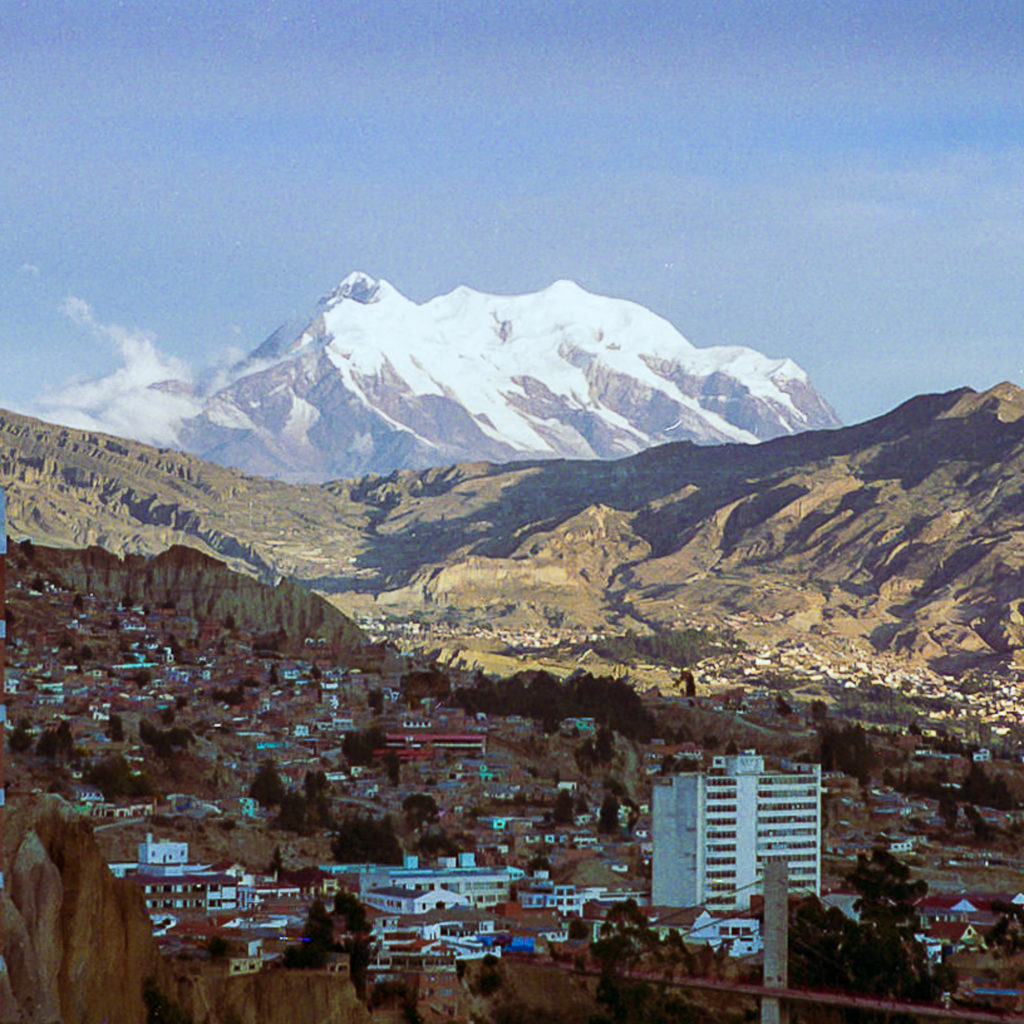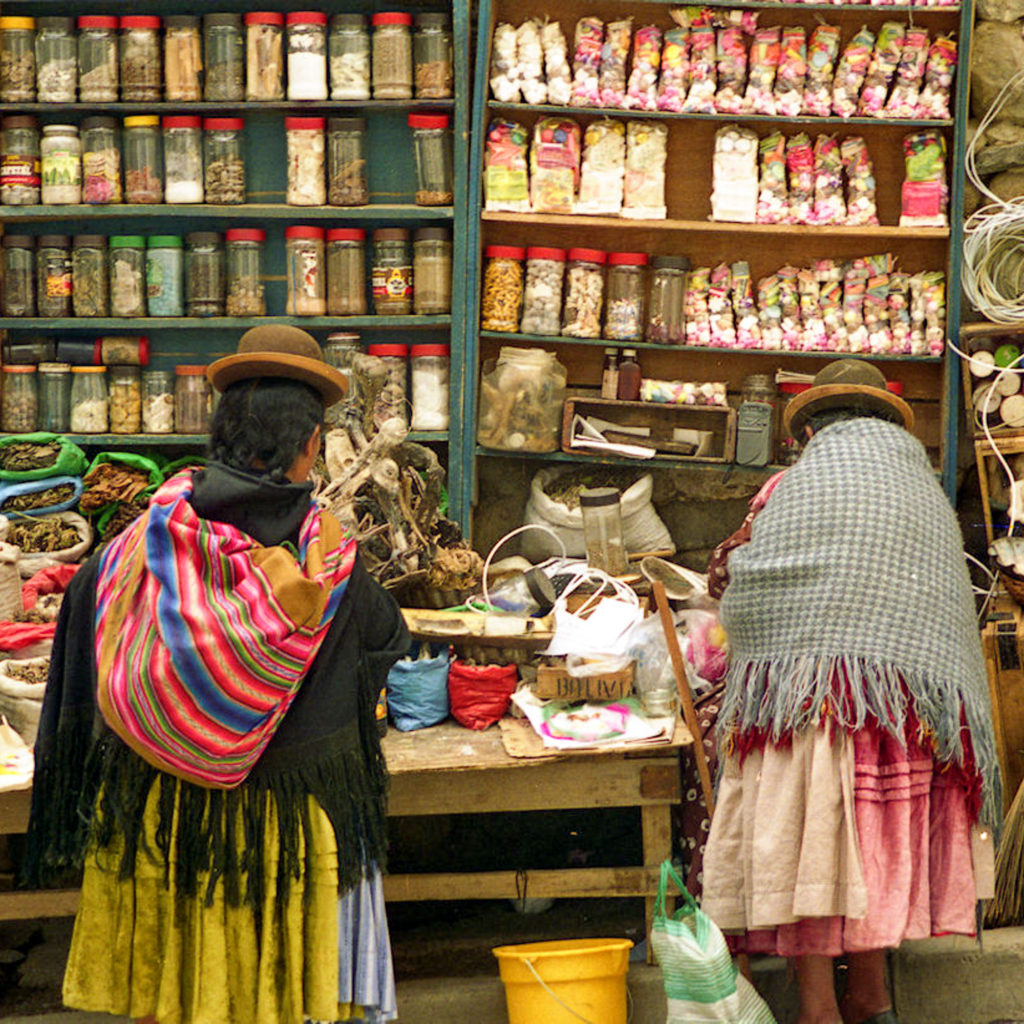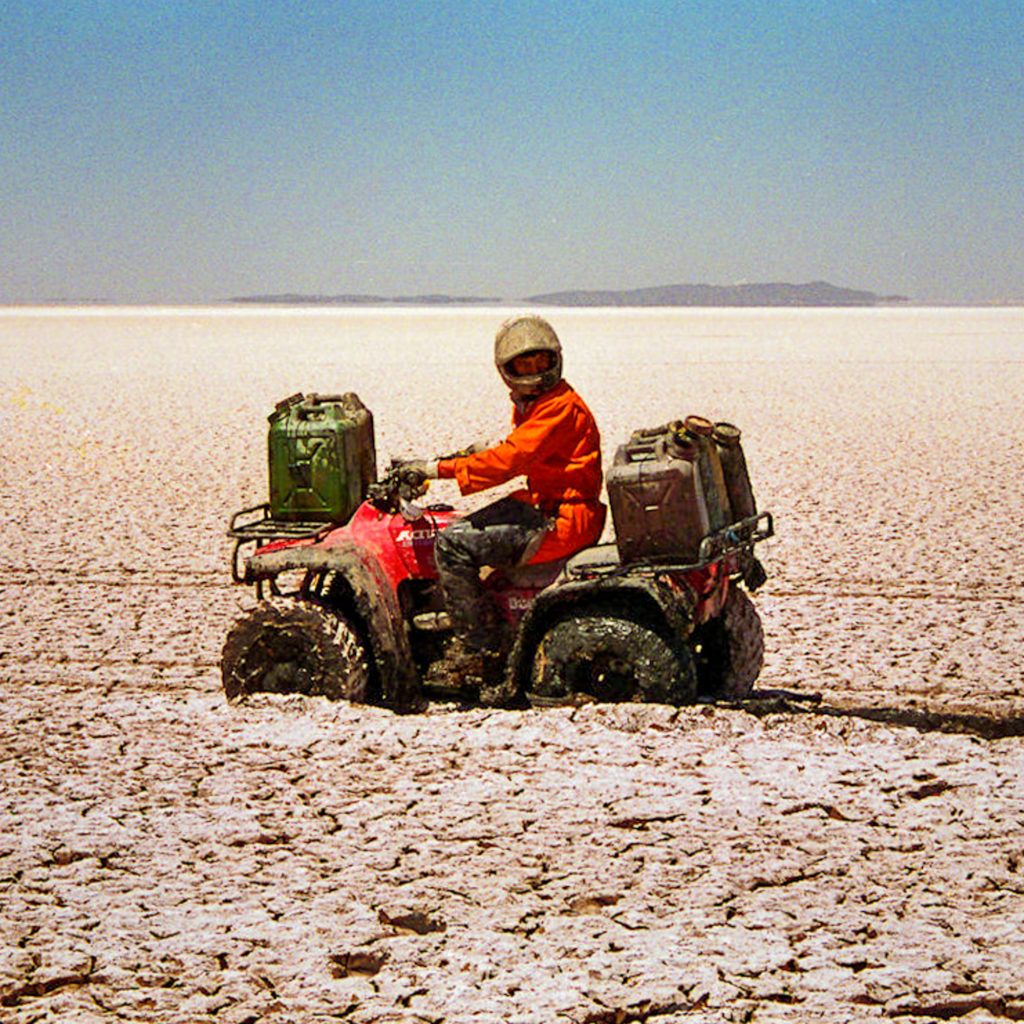I have three episodes from Bolivia to share. Let this be the first.
Theman had an acute sense of the absurd such as we’d all get if only we could keep our eyes open.
I was lucky enough to work with Theman in two countries. He was technically proficient, an expert in his field and professionally, utterly dependable. He was a devil for the details, an incisive and dogged detective. Which are great attributes for a surveyor. And besides, he was great company to travel with.

La Paz 1994 
Oruro Shopping 1994
We first met in the Andes, up on the altiplano in Bolivia and a few years later we had a second encounter in the deserts of Niger. We were three months in the one, six months, on and off, in the other. There was a lot of time to exchange old blusters and experience new absurdities.
A measure (sic) of Surveyor Theman was that I was with him when he spent days chasing a centimetre of horizontal error. I’m not going to go into the details but today’s satellite accuracy is about 4 metres. We aimed for 25 centimetres or thereabouts in the days of Transit before GPS standardisations. We achieved this by differential corrections relative to known fixed points like the ‘trig’ benchmarks at the tops of mountains. The missing centimetre bothered him until he back calculated that it must be an atmospheric problem. The theodolites were calibrated by celestial observation, computed relative to the sun’s azimuth in this case. Refraction corrections depend on the amount of atmosphere through which light passes. We were in the Andes, above 4000 m, and Theman reckoned that the instruments were out of specification because they had been calibrated down at sea level. Some parallax and refraction corrections were needed for use at high altitude. The surveyors he was overseeing eventually confirmed this was the case and he relaxed by looking for the next problem.
Raconteur Theman had a keen eye for the grains of truth in simple absurdities.
A Sunday morning in Timbuktu once found Theman wandering by the river and along the streets like a tourist. He was attracted into a church by song, Sunday hymns that he said filled the street. He said the sight of an all female choir and the clarity of their singing was unforgettable. All the more unforgettable was when a large lady soloist stepped to the front and in the Francophone city, she belted out a verse with a voice bigger than the church. The French speaking part might have explained how she was comfortable wearing a top emblazoned with SHIT HAPPENS in front of the altar, the priest and the congregation.
Theman was a Yale alumnus. He didn’t take this heritage as seriously as many do. But he’d recognise a Yale Alumni sweatshirt from 1000 paces. And he retold how he saw one on the side of a dusty, laterite road in Chad. The Yale man was desperately trying to flag Theman’s vehicle so that they might buy one or more of the live chickens he was waving by their feet. Theman had gone to Yale after a time among the engineers in the US Army and wondered if the Chadian chicken seller had been similarly subsidised. Perhaps not.
Theman had a collection of stories that he accumulated from most of his assignments. And Bolivia added several to his collection (and obviously to mine too). He was a great companion for a six hour drive or a six beer evening because there was never nothing to talk about. He wasn’t a gabbler at all; in fact he was very pensive and could be slow to speak. He was worth waiting for, always worth a listen.
There is a town near Lago Poopó called Challa Cruz that Theman thought would be the most likely place for a sighting of Elvis. Elvis was long dead in the rational world but there was a cadre of devotees who intermittently appeared in the US news while they searched the world for The King. We drove through Challa Cruz several times but never did catch a glimpse of Elvis. Indeed, I worried that our Bolivian driver took this too seriously. Perhaps we helped him create a tourist niche and maybe he runs tours for Elvis spotters still.

Sunburn Salar 1994 
Flamingoes Unseen 1994
We laughed a lot when we crossed the bridge down near Pampa Aullugas. We’d driven many boring hours south from Oruro across the salty, dried out lake bed of Lago Poopó and needed to leave the sealed road, cross a drainage ditch and take an unsealed road towards the west. Eventually there came a bridge. A bridge with a hut more the size of a British or Irish telephone box than a place of work. You cannot imagine how flat the area was. This was the tallest thing apart from our Mitsubishi 4X4 for leagues and leagues in every direction. And like so much of the altiplano, there was a bicycle propped outside. It turned out to be a toll bridge. Of course it was occupied by a uniformed ticket collector who stood in front of us to demand the toll. It was like a token charge and he had no change because he had no customers for days if not weeks on end. We found the smallest denomination note among us and handed it over. Ten times the toll but he wouldn’t accept it. He became agitated and nervous. He accused us of of being criminals; he thought we’d made an error that exposed us as currency forgers. In taking the note, he was so bored and so very deprived of company that he compared the serial numbers that were printed twice on the front. They didn’t match. The note had been torn and repaired with sellotape and in the process a digit was dropped. He’d not seen sellotape before. The bad reputation of criminals was well known in these parts.
It was funny and sad. The gatekeeper had decided to accept the note and gave us a receipt for the one-way toll. We wondered how far he cycled every day after he warned the bridge would close at nightfall. The receipt is a bookmark somewhere near me, just waiting for me to revisit those pages.
The hotel in La Paz had five gold stars on the outside of the entrance door. Theman wryly noted that there were only four on the obverse. Once seen, never forgotten. Especially amusing because the hotel was overrun with people who’d come to see the total solar eclipse. November 3, 1994 in case you wondered. Their familiarity with astrography would doubtless have given them the magnitude and colour of each star but they failed to see the star-count disparity. Judging from snippets overheard at the breakfast buffet, they noticed the less than stellar service but not that the door candidly admitted it. I do regret that we couldn’t go to Potosí or even have stayed in Oruro for the totality though the eclipse as seen in La Paz was quite impressive.
It was Theman who suggested we leave a pizza bar in Oruro after he’d impaled the local police chief with the clothes hook on the back of the toilet door. I thought it was a wind up but on inspection, I found the police Chief was still there, attached to the inside of the door, held fast and upright by the hook lodged in the collar of his jacket. He’d been drinking with colleagues in celebration of his birthday. They were all totally ossified and hadn’t noticed his absence. Theman had pushed the toilet door not knowing the Chief was standing urinating inside. It seemed that the Chief had passed out when the door hit him. I can’t say what happened down at trouser level. The bar owner had earlier admitted that the Chief had a monthly birthday which the bar honoured with free drinks for his table for a few hours on the last Friday of each month. A couple of Brazilian women who worked the bar also explained they too honoured the local police Chief and his guests in exchange for guaranteed renewals of their licences to trade. Under the circumstances, we were very happy to be leaving Oruro for the last time the next day.
I visited with Raconteur Theman a few years later. He lived in Texas and we did a tour of bars near his home one swelteringly hot Sunday afternoon in September. We met several of his drinking buddies and I shouldn’t have been surprised that they knew who I was. My favourite encounter that day was brief and with a staggering man we met in an ice-house. He had driven up and managed to bump the rickety shack that was the roadside ice-house with the front of his substantial limousine. Nobody batted an eye and the barkeep simply opened a cold beer and put it, together with an ashtray, on the counter where the judge like to sit. That’s what Theman said. ‘The Judge always sits at the same place’. And that’s where we left him after brief introductions as we headed to another bar that Theman just had to show me. There I met a redneck racist who asked me about my travels with Theman in Africa and peppered me with racist jokes that were never appropriate in the history of mankind. Theman asked me what I thought on the way home. ‘Clansman?’ I ventured. Theman laughed ruefully as if to say ‘Texas!’ as only a New Englander could.
What he actually said was ‘He really liked you.’

Someone has to to say it – your surveyor was The Man!
Love your Theman friend